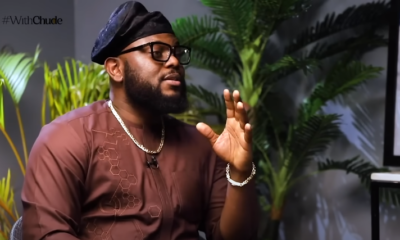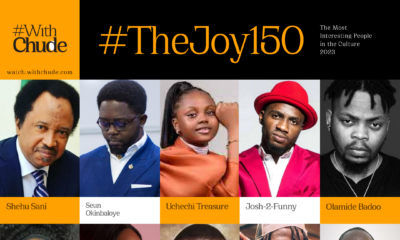News
#NewLeadership Series with Chude Jideonwo: Soaring On the Wings of Hope
 A lot of Nigerians who want to try and change their country and who have a zeal to do so are being discouraged by the myriad of challenges that abound. There’s the school of thought that there’s so much to do but few people willing and able to do them. The idea is that the situation in the country is so hopeless and there is nothing we can do.
A lot of Nigerians who want to try and change their country and who have a zeal to do so are being discouraged by the myriad of challenges that abound. There’s the school of thought that there’s so much to do but few people willing and able to do them. The idea is that the situation in the country is so hopeless and there is nothing we can do.
I have been there many times, and not too long ago. I have spent the past eight years of my life working for country in one way or the other, and trying to sell hope and working to build platforms for my generation to impact the country, but very frequently I find myself so terribly disillusioned. It feels like I cannot succeed where, to rely on recent history, Gani Fawehinmi, Chinua Achebe,Aminu Kano and others have failed. At those times, I have managed to inspire myself by reminding myself of five times in my life when I have felt such an incredible sense of hope and faith – in myself, in my countrymen and in change.
Those examples are all Nigerian and I’d like to share them with you.
I was in secondary school; Mayflower, Ikenne on 9, June 1998 . I remember exactly where I was, in front of the dining hall, a few feet away from B1 Up hostel – when the fiery widow of the late Tai Solarin called emergency assembly and announced with joy to us – Nigeria’s most debilitating dictator, SaniAbacha, was dead.
I remember very clearly that was the first time I came across this Bible verse, shared with me I think by a classmate: “When the righteous proper the city rejoices, when the wicked perish, there are shouts of joy.”
My joy wasn’t in his death alone, and I will not deny my relief at the passing of General Abacha. My joy was in the fact that we had been cutting and cutting at this evil tree and finally it had come down. There are many who say Mr.Abacha didn’t die because of the people battled him, but from poison, pure and simple.
If you lived in Nigeria in those times , it is impossible not to have been inspired by the principles of Wole Soyinka, the strength of Kudirat Abiola, the chutzpah of Kunle Ajibade, the defiance of MD Yusufu, the soaring rhetoric of Tunji Braithwaite, the relentlessness of Joe Okei-Odumakin – and the many others who simply refused to be cowed by military might. We might not have ‘taken’ General Abacha down, but that collective Nigerian insistence, expressed through national activism, created the hostile atmosphere that made it impossible for AbdulsalamiAbubakarto do anything but hand Nigeria over to a democratically elected government.
Just remembering those heady times, and the excitement of change, the voices that came together, and the unshakeable faith that it spoke of warms my spirit. When I remember the soaring campaign of Obasanjo versus Falae,which I followed with excitement when when I could not vote. I remember the adverts on the NTA Network as the charismatic (or so I decidded since he was my candidate) OluFalae declared “I present myself as the candidate of that change.” He lost that election – but Nigeria, ultimately, won.
2007 brought two more moments. It was apparent to many that the Presidency was plotting an immoral‘third term’ for Olusegun Obasanjo. At the very least, Mr. President took on an unseemly ambivalence that reminded one of General Abacha and his suggestive deceptive silence. The media was awash with reports of graft – with legislators reportedly (one must note that this was never proven) receiving sums from N50 million to N150 million to propel the ‘third term’ plot forward.
I was depressed. At last, Nigeria had chosen democracy as a way of life; a keen expression of the will of the people, and we had come thus far, in light of our recent history – and then this? With confidence in the National Assembly as a house of principled people at its lowest, we all felt like it was inevitable – Mr.Obasanjo was going to unleash his unfortunate aspiration on Nigeria, one taken straight out of the playbooks of sit-tight despotic leaders.
On May 12, 2006,42 senators announced their opposition to the motion; it was five more than was necessary to defeat it. The Nigerian Senate made us all proud and proved the beauty of democracy. It aligned itself voice of the people and killed the proposed constitutional amendment that would have allowed the country’s president to run for a third term. Our democracy worked. The people could defeat an unpopular government. Oh, the joy.
It was barely a year later and the man was back again. This time,Olusegun Obasanjo was very determined – Atiku Abubakar was not going to continue to be his Vice President.
The combined effect of Sections 135, 142(2), 143, 144, 146 and 308 of the Constitution of the Federal Republic of Nigeria 1999 was that the president could not sack his deputy, whose allegiance lies neither to party nor boss, but to the constitution.
An inconvenient law to be sure– I mean, a man should be able to choose his own deputy – but it was the law. And that is the essence of the rule of law. It is to be adhered to strictly, even if you were the president of Africa’s most populous nation.
Again, it looked like the president would have his way. Would the rule of law be aside on this trifling matter? Would the courts choose saving the face of the powerful man against establishing equality before the law? The Court of Appeal decided differently and, on April 16 2007, the Supreme Court followed suit, chastising the Independent National Electoral Commission for seeking to disqualify Abubakar Atiku from contesting the presidential elections.
You could feel the burst of joy across the country, and the immeasurable pride we felt in our judiciary. I felt that joy, so much so I couldn’t help sharing it on my blog the next day.
2010 presented another opportunity. I had just returned to Nigeria after a holiday and I was besides myself with anger. It is the angriest I have ever been in my life, I think.
Our president, Umaru Musa Yar’Adua was missing, for months, and we were all supposed to act like this was just one of those things. There was an impasse in government. Mr. Yar’Adua had not handed over to his vice-president.Government was grounded to a halt. There was a fuel scarcity, the budget had not been signed, electricity supply was at a historic law, there was carnage in Jos, enough for the woman to march the streets in naked protest.
The clamour heightened in the media that the National Assembly take action and make his vice the Acting President so the country could move forward. To stall the inevitable, Nigerians were hit with an avalance of dubious “he is coming in tomorrow”, “he is jogging in the villa” statements and then a dubious BBC interview. It was an outrage.
I couldn’t imagine my sitting down and doing nothing. I was also very doubtful that my peers, famously a lethargic set, would answer a call to action. Would we risk our livelihoods, even our lives? Would we walk the talk? Would we move from social media to the grounds where it mattered most?
Nigerians proved this two times. The first time when thousands joined Wole Soyinka, Tunde Bakare, Pat Utomi and others and marches down the streets of Abuja and demanded that President Yar’Adua return to his duty post, or the law should take its course and his deputy should assume office.
Protesters were back on the streets in a matter of weeks – and this time it was the young people. It has taken me as many weeks of planning, investing time and money to build a coalition, and a nagging sense that we would fail because young people were not ready. Even until I boarded that flight from Abuja to Lagos, and as we sat for a few wrenching minutes at the Eagle Square, worried about just how many people would turn out – would this be, as the leader of the policemen who came there to intimidate us told us, “just young people dancing and then going home”?
But on that beautiful day, March 16 – also my birthday – I led over a thousand angry, fed-up young Nigerians on a march to the National Assembly, where we sat, we stood, we marched, and then we overwhelmed a human shield of battle-ready security agents, and made a triumphant march to make our point – Yar’Adua gets back to work, or gets out of Nigeria’s way, amongst others.
It was a matter of weeks before we got our request, but get it we did.No doubt deriving moral authority from common Nigerians who took to the streets and demanded rule of law. The Senate did the right thing, and within the ranks of a confused political class, the vice-president had been sworn in.
These were people setting the pace for the leaders; these were people taking their destiny into their own hands. It was a victory for civil society – it was a victory for people power.
I remember when I first read the proposal –a group of young people who had no real money, no high-up political connections, they had little but they had a huge love of country, belief in self and a keen sense of history as the 2011 elections approached –to host Nigeria’s first youth-driven presidential debate.
Almost everyone said it was near impossible – where would we get the money? Who would give us the airtime? Would the candidates take us seriously? How we achieved what we did was a miracle – getting airtime on Channels Television, raising the millions from a starting point of ZERO Naira, getting Nuhu Ribadu, Ibrahim Shekarau, Dele Momodu, and others to join the conversation.
Unfortunately – and this made me as angry as it made me sad – Dr. Goodluck Jonathan a self-professed youth-focused candidate, who should have enthusiastically embraced this opportunity, rather opted for a tainted youth concert on the same night in the same city, and a dubious interview with a music celebrity. He shunned this debate along with all the others he had shunned thus far.
The organisers of the debate were crestfallen – it looked like the moneyed Jonathan campaign, was about to take the wind out of our sails. But something happened. The night that young Nigerians, at least track-able on social media, suddenly rose together with such a visceral rage: Who told them that on the eve of such an important election, a concert would impress us more than a debate about the issues that concerned us? Where the Nigerian youth stood was clear on that evening and everyday after – we knew what we wanted, we knew what was good for us, and we knew what was good for our nation.
Dr. Jonathan didn’t show up, and MuhammaduBuhari petulantly followed suit – another cause for great disappointment – but we pulled it off, and managed on one night, to focus the media nationally on the issues that concerned Nigeria’s youth. It was a victory. It was a heart-warming victory. It made me so incredibly proud to be Nigerian, to be young, and to keep faith.
The morale of these stories is simple, and perhaps I can capture it like this:
Do you think your generation can make a difference – big enough to shake the foundations of corruption and cause a change?
Oh yes! Oh certainly yes! Any generation in any country can! It’s not a cliché. Countries from Rwanda to America have been changed by a people sufficiently motivated. If the question is are we ready? It’s a big NO. If it’s can we do it, it’s a big YES. If anyone tells you that that is a lie; if anyone takes a look at the dire situation of our country, and tells you it is a waste of time to hope, to believe, to act, tell that person to go tell it to the marines. We can change this country. We have history to guide us; we have faith to motivate us.
All we need to do is build our capacity to make it happen. Oh, by God, we can. Do not – ever – forget that.
___________________________________________________________________________________________________
Chude Jideonwo is publisher/editor-in-chief of Y!, including Y! Magazine, Y! Books, Y! TV & YNaija.com. He is also executive director of The Future Project/The Future Awards. #NewLeadership is a twice-weekly, 12-week project to inspire action from a new generation of leaders – it ends on March 31.



























